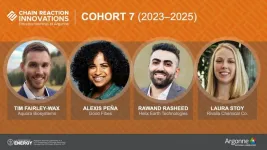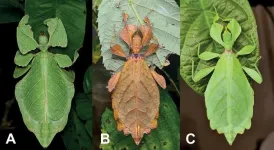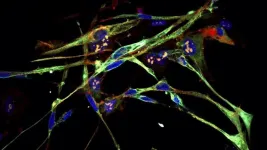(Press-News.org) Four new innovators recently joined Chain Reaction Innovations (CRI), the Lab-Embedded Entrepreneurship Program at the U.S. Department of Energy’s (DOE’s) Argonne National Laboratory, as part of the program’s seventh cohort.
Each innovator will collaborate with a host scientist at Argonne while embedded full-time at the laboratory. Innovators plan to develop clean energy startups that reduce greenhouse gas emissions and increase U.S. competitiveness in emerging energy technologies. The goal of innovators and the CRI program is to support the country’s equitable clean energy economy and its goal of net-zero carbon emissions by 2050.
“CRI is a unique program that provides unparalleled access to a national lab and the regional innovation ecosystem.” — Dick Co, director, Chain Reaction Innovations
CRI’s impact is far-reaching as it celebrates its seventh year of embedding entrepreneurs at Argonne. CRI’s first cohort graduated in June 2019, amassing millions in investment. The combined total raised by CRI startups through July 2023 is over $427 million, and the program has helped create 641 U.S. jobs to date.
“I’m thrilled to welcome our new CRI entrepreneurs, who will help us solve complex energy challenges with their cutting-edge startups,” said Argonne Director Paul Kearns. “Our partnership with these innovators exemplifies how our laboratory accelerates the science and technology that drive U.S. prosperity and security.”
The new innovators in Cohort 7 and their projects are:
Tim Fairley-Wax, Biomembrane Filtration: Unlocking Energy Recovery from Waste Streams
Alexis Peña, Man-Made Bioengineered Protein-Based Fibers to Replace Petroleum-Derived Textiles
Rawand Rasheed, Retrofit Dehumidifier for Substantial Air Conditioner Energy Reduction
Laura Stoy, Recycling of Coal Fly Ash for Rare Earths and Concrete
“CRI is a unique program that provides unparalleled access to a national lab and the regional innovation ecosystem. The CRI team and I are excited to support this group of talented innovators at the start of their entrepreneurial journeys,” said Dick Co, CRI’s director.
Innovators were selected following a national solicitation process and a two-part pitch competition with judging from local, regional and national industry experts, scientists and engineers.
CRI is supported by Argonne and the following DOE entities:
The Office of Energy Efficiency and Renewable Energy’s Advanced Materials and Manufacturing Technologies Office and Industrial Efficiency and Decarbonization Office
The Office of Fossil Energy and Carbon Management
The Office of Science
The Advanced Scientific Computing Research program
Learn more about the Cohort 7 innovators and their technologies.
Applications for CRI’s next cohort will open on Oct. 15, 2023.
Argonne National Laboratory seeks solutions to pressing national problems in science and technology. The nation’s first national laboratory, Argonne conducts leading-edge basic and applied scientific research in virtually every scientific discipline. Argonne researchers work closely with researchers from hundreds of companies, universities, and federal, state and municipal agencies to help them solve their specific problems, advance America’s scientific leadership and prepare the nation for a better future. With employees from more than 60 nations, Argonne is managed by UChicago Argonne, LLC for the U.S. Department of Energy’s Office of Science.
The U.S. Department of Energy’s Office of Science is the single largest supporter of basic research in the physical sciences in the United States and is working to address some of the most pressing challenges of our time. For more information, visit https://energy.gov/science.
END
New startups join Argonne’s entrepreneurship program
Chain Reaction Innovations announces new cohort
2023-08-28
ELSE PRESS RELEASES FROM THIS DATE:
Curious and cryptic: new leaf insects discovered
2023-08-28
An international research team including the University of Göttingen has described seven previously unknown species of leaf insects, also known as walking leaves. The insects belong to the stick and leaf insect order, which are known for their unusual appearance: they look confusingly similar to parts of plants such as twigs, bark or – in the case of leaf insects – leaves. This sophisticated camouflage provides excellent protection from predators as well as presenting a challenge to researchers. Genetic analysis enabled the researchers to discover “cryptic species”, which cannot be distinguished by their external appearance alone. The findings are not only ...
Preparing clinicians for the international anti-LGBTQI+ crisis
2023-08-28
Contact: Maria Ober, 617-224-8963, mpober@bu.edu
Preparing Clinicians for the International Anti-LGBTQI+ Crisis
Medical community should build systems that are responsive to this population
(Boston)—Lesbian, gay, bisexual, transgender, queer, intersex and additional sexual and gender minority (LGBTQI+) people in every region of the world face marginalization and oppression. At least 67 countries ban sexual conduct between consenting adults of the same sex. According to a report from the ...
PSA levels after treatment may not be reliable predictor of survival for patients with prostate cancer
2023-08-28
FINDINGS
A UCLA-led study found treatments that reduce the risk of being diagnosed with a cancer recurrence based on rising prostate-specific antigen (PSA) levels after radiotherapy, commonly referred to as biochemical recurrence, do not necessarily improve a patient’s long-term overall survival.
The team of investigators found that while biochemical recurrence was associated with a higher risk of death, it still did not meet the criteria to be a reliable surrogate endpoint for overall survival. As defined by the FDA, a clinical outcome directly measures whether people in a trial feel or function better, or live ...
Two networks, two realities, one big problem
2023-08-28
National news coverage from the two largest broadcast outlets, CNN and Fox News, not only reflects growing political polarization in America, but in a recent publication, researchers at Virginia Tech have shown that partisan and inflammatory broadcast coverage has increased over time and can exacerbate growing divides in the new public square of social media.
Collaborative insights
Eugenia Rho is assistant professor in the Department of Computer Science with a background in political science and a passion for ...
The physics of fat droplets reveal DNA danger
2023-08-28
Fat is a normal and necessary part of the body. Fat cells store and release energy, as well as play significant roles in hormonal regulation and immunity.
In recent decades, a concerning rise in metabolic illnesses – such as cardiovascular disease, high blood pressure and diabetes – has focused scientific attention on the biology and chemistry of fat, resulting in a wealth of information about how fat cells work.
But fat cells and their metabolic activities are only part of the story.
Fat-filled lipid droplets, tiny spheres ...
SfN’s TPDA Program earns ASAE 2023 Power of Associations Gold Award
2023-08-28
WASHINGTON, D.C. – The Society for Neuroscience (SfN) earned a Power of Associations Gold Award from the American Society of Association Executives (ASAE) for its successful Trainee Professional Development Award (TPDA) program. ASAE’s Power of Association awards celebrate and promote the invaluable contributions that associations make within the U.S. and globally through catalytic initiatives focused on professional advancement, global development, diversity and inclusion practices, advocacy, and community support and engagement.
In operation since 2015, the TPDA program recognizes undergraduate and graduate ...
New approach to fighting malaria
2023-08-28
RIVERSIDE, Calif. -- The mosquito-borne infectious disease malaria resulted in about 241 million clinical episodes and 627,000 deaths in 2020. In young children and pregnant women living in areas where the disease is endemic, a major cause of death is Plasmodium falciparum, the most virulent, prevalent, and deadly human malaria parasite.
Scientists are keen to understand the mechanisms that regulate gene expression through the different stages of P. falciparum’s lifecycle because such knowledge can ...
UMass Amherst computer scientists use AI to accelerate computing speed by thousands of times
2023-08-28
AMHERST, Mass. – A team of computer scientists at the University of Massachusetts Amherst, led by Emery Berger, recently unveiled a prize-winning Python profiler called Scalene. Programs written with Python are notoriously slow—up to 60,000 times slower than code written in other programming languages—and Scalene works to efficiently identify exactly where Python is lagging, allowing programmers to troubleshoot and streamline their code for higher performance.
There are many different programming ...
Rare disease shares mechanism with cystic fibrosis
2023-08-28
Aug. 28, 2023
Images
ANN ARBOR—University of Michigan researchers have discovered that the same cellular mechanism involved in a form of cystic fibrosis is also implicated in a form of a rare disease called cystinosis.
The mechanism cleans up mutated proteins. In cystinosis, a genetic disease, this allows cystine crystals to build up in the cell. This disrupts the cell, and eventually, tissues and ultimately organs, particularly the kidneys and the eyes.
The problem begins when the lysosome, an organelle within the cell, is unable to ...
Once rhabdomyosarcoma, now muscle
2023-08-28
“Every successful medicine has its origin story. And research like this is the soil from which new drugs are born,” says Cold Spring Harbor Laboratory Professor Christopher Vakoc.
For six years, Vakoc’s lab has been on a mission to transform sarcoma cells into regularly functioning tissue cells. Sarcomas are cancers that form in connective tissues like muscle. Treatment often involves chemotherapy, surgery, and radiation—procedures that are especially tough on kids. If doctors could transform cancer cells into healthy cells, it would offer patients a whole new treatment option—one that could spare them and their families a great deal of ...
LAST 30 PRESS RELEASES:
Scientists discover why we know when to stop scratching an itch
A hidden reason inner ear cells die – and what it means for preventing hearing loss
Researchers discover how tuberculosis bacteria use a “stealth” mechanism to evade the immune system
New microscopy technique lets scientists see cells in unprecedented detail and color
Sometimes less is more: Scientists rethink how to pack medicine into tiny delivery capsules
Scientists build low-cost microscope to study living cells in zero gravity
The Biophysical Journal names Denis V. Titov the 2025 Paper of the Year-Early Career Investigator awardee
Scientists show how your body senses cold—and why menthol feels cool
Scientists deliver new molecule for getting DNA into cells
Study reveals insights about brain regions linked to OCD, informing potential treatments
Does ocean saltiness influence El Niño?
2026 Young Investigators: ONR celebrates new talent tackling warfighter challenges
Genetics help explain who gets the ‘telltale tingle’ from music, art and literature
Many Americans misunderstand medical aid in dying laws
Researchers publish landmark infectious disease study in ‘Science’
New NSF award supports innovative role-playing game approach to strengthening research security in academia
Kumar named to ACMA Emerging Leaders Program for 2026
AI language models could transform aquatic environmental risk assessment
New isotope tools reveal hidden pathways reshaping the global nitrogen cycle
Study reveals how antibiotic structure controls removal from water using biochar
Why chronic pain lasts longer in women: Immune cells offer clues
Toxic exposure creates epigenetic disease risk over 20 generations
More time spent on social media linked to steroid use intentions among boys and men
New study suggests a “kick it while it’s down” approach to cancer treatment could improve cure rates
Milken Institute, Ann Theodore Foundation launch new grant to support clinical trial for potential sarcoidosis treatment
New strategies boost effectiveness of CAR-NK therapy against cancer
Study: Adolescent cannabis use linked to doubling risk of psychotic and bipolar disorders
Invisible harms: drug-related deaths spike after hurricanes and tropical storms
Adolescent cannabis use and risk of psychotic, bipolar, depressive, and anxiety disorders
Anxiety, depression, and care barriers in adults with intellectual and developmental disabilities
[Press-News.org] New startups join Argonne’s entrepreneurship programChain Reaction Innovations announces new cohort





